Elvis is in the building, strutting his stuff on Susan Boyle's mantelpiece. Not black, leather-clad Elvis – you can't have everything – but a plastic, white, rhinestone-clad Elvis sent by one of Boyle's legion of fans who heard she was to duet posthumously with the King. It gets surreal when his rich, dark voice shivers from speakers, blending with her light clarity in a spine-tingling version of "Oh Come All Ye Faithful" from her fourth album, Home for Christmas. With music, Boyle is finally animated. Since my arrival, she's been perched quietly on the edge of her sofa, avoiding eye contact with the stranger in her living room. There is something of the watchful little girl about her, dressed in her smart frock-for- visitors: plain black with a white Peter Pan collar. Her PR talks while Boyle stays silent. Her personal assistant serves soup and sandwiches while Boyle observes. (I've been invited for lunch, but Boyle has already had hers.) It is Boyle's home, yet you could easily mistake her for a visitor here, too.
"Did you like that?" she asks when she and Elvis have finished. There is a touching vulnerability about the Scottish singer that seems at odds with the robustness of her extraordinary career – 14 million album sales in 14 months. The first British female artist (followed only by Adele) to have a number one album in the UK and the US simultaneously. Now Boyle is diversifying. She has a cameo role in The Christmas Candle, a festive, feel-good film based on the novel by Max Lucado. Fox Searchlight is also in pre-production of a film about her life, with Meryl Streep topping the company's wishlist to play Boyle. Her world outside this sitting room is expanding all the time. She comes back here, to her council house in Blackburn, West Lothian, to remind herself who she really is.
Her appeal? "I'm a cheeky bugger, aren't I?" she says. "I am approachable. I am the same as you, I think." That is not strictly true. You would not meet Susan Boyle and think her quite like other people. Indeed it was her unique combination of the ordinary and extraordinary that charmed the public when she sang on Britain's Got Talent in 2009. Her voice is visceral, emotive, but it was only when combined with the expectations of an audience that gazed at a middle- aged woman with grey hair and thought she was going to sound like a strangled cat, that it became truly special. It was the element of surprise: the juxtaposition of her mundane appearance, her weird little wiggle and offbeat humour with the sheer, life-affirming determination of her dreams that made a nation of viewers wipe a silent tear as they reached for a cuppa and a digestive round the telly.
Boyle knew people were laughing at her before she sang that night. In fact she was having a laugh herself, she says. She had attended 12 television auditions over the years and included BGT because she liked "Piersy baby", Piers Morgan. "I am flame-resistant when it comes to laughter," she remarks almost carelessly, and perhaps nothing she says gives more insight into her life or her spirit. "You think: I'll show them."
Interestingly, when her initial wariness wears off, Boyle displays warmth, kindness and empathy in conversation. This is sometimes lost in articles about her, which refer variously to "learning difficulties" or "slowness" caused by complications at birth. Such descriptions are a puzzle – like looking at an apple and being told it's a pear. Boyle is perfectly intelligent. Her assistant reads a glowing review of her new album, stumbling over a word before she can place it. "Timber?" she speculates. "Timbre," corrects Boyle immediately. "It means colour."
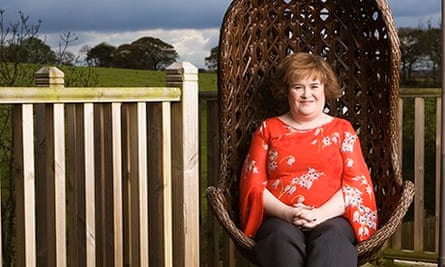
No, the clues lie elsewhere. The delayed eye contact. The visible anxiety until the stranger in her presence settles into at least superficial familiarity. The slightly offbeat laughter in the middle of conversation. The sudden and obvious emotional withdrawal if she feels uncomfortable with a particular subject. (She does not like to criticise anyone, and you can almost see her anxiety levels rising.) Crucially, the fact is she is surrounded by people: a personal assistant who lives locally; a PR from London who flies up specially for this interview. She also has a manager and someone who helps with housework. "I am not strong on my own," she admits. "When I have the support of people around me, I am fine."
Sometimes people misunderstand. Sometimes she gets frustrated. "Some articles have said I have brain damage," she acknowledges, before adding, cryptically: "It's been something else." A year ago she went to a Scottish specialist. "I have always known that I have had an unfair label put upon me," she explains. The specialist discovered her IQ was above average. And the diagnosis? "I have Asperger's," she says calmly. Asperger's, a high-functioning form of autism, mainly affects people's social interaction and communication skills. When she says the word, things fall into place. Finally, it's like looking at an apple and agreeing it really is an apple. "It is," she says, "a relief."
Fame is a precarious thing. It brings affirmation and criticism, security and insecurity, triumph and disappointment, almost in equal measures. But what it has also brought Susan Boyle is acceptance. Asperger's – unnamed as it was – made her different, and her childhood was marred by feelings of being an outsider. "That made me more determined to be where I want to be." But she admits that the isolation, the attempts to prove herself to people who didn't always understand, left a legacy of inner anger and frustration. "You don't fight without some resentment," she says.
Success – and her diagnosis – changes things. "Asperger's doesn't define me. It's a condition that I have to live with and work through, but I feel more relaxed about myself. People will have a greater understanding of who I am and why I do the things I do."
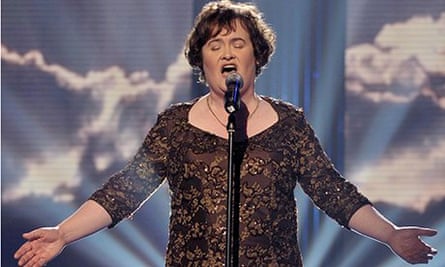
Boyle's home town of Blackburn is a small industrial backwater between Glasgow and Edinburgh with a history of coal mining. Boyle was from a large Catholic family of nine children, and the most important relationship of her life has been with her mother Bridget. She was a quiet, gentle woman, regarded locally as "a lady" and always referred to formally as "Mrs Boyle" rather than Bridget. She was Susan's fiercest protector and, like her daughter, had a creative spark. Aged 70, Bridget began painting, copying Mediterranean scenes from postcards. The results now adorn the walls of the room where we sit.
Bridget died just before her daughter became famous. The two events are connected in Susan's mind. "I made a promise to my mum that I would do something with my life." Her mum, she believes, helped her fulfil the promise. "Spiritually, she's with me all the time. She has had a word with someone upstairs, because I wouldn't have had this otherwise. There has been some sort of intervention in some way. I do feel that."
Despite building what she calls "the posh house" close by, Boyle has now let her niece live in it and continues to live by herself in her mother's council home. It wasn't so much the building that drew her back – it's an ordinary terraced house in a neat but grey housing scheme. It was the memories, the sense of her mother's presence. She struggled when Bridget died. "I felt as if the cord had been broken emotionally and I didn't know what to do. My weight went down and my house was a bit of a mess. I had to get social services in. I couldn't cope at all." Was she frightened? She nods. "Very frightened."
She has also lost a brother and a sister, Kathleen, to whom she was particularly close. Kathleen died 13 years ago. "You never think of a brother or sister dying. You think they will be there for you. When they're not, it's not only a shock, but you have a sense of unfairness about it all. It made me a bit angry, lashing out at people. It's something that even today I still struggle with, not just Kathleen's death, but other people who have been close to me. It doesn't do a lot for your security."
Security seems a key concept for Boyle. Asperger's often creates anxiety in sufferers, makes them teeter like a sheet of paper poised on the edge of a table in a draught. "I struggle with relationships," she admits. "I never know if people are genuine. I would say I have relationship difficulties, communicative difficulties, which lead to a lot of frustration. If people were a bit more patient, that would help."
Growing up, when people let her down, music was a companion. Her house rocked with Elvis and rolled with the Osmonds. She spent teenage years swooning over Donny, and watching footage of her performing with Osmond, the overawed teenager is strikingly evident still in the middle-aged woman.
This article includes content provided by Spotify. We ask for your permission before anything is loaded, as they may be using cookies and other technologies. To view this content, click 'Allow and continue'.
She lives alone but once had a boyfriend when she was in her 20s. Her father Patrick ended the relationship. Patrick Boyle was a miner, and while Susan loved him, their relationship was different from the gentle one she shared with her mother. "My dad was the boss and not a great one for showing his emotions. He had a lot of hurt over events in his own life. He was a sergeant major in the army in the Second World War and he must have seen a lot of things. When he came home from the army he would sit and cry for no reason and there were just some things we couldn't talk about. People beside him being killed… that must have been traumatic."
Ask if she resents her father's decision and the question sparks defiant loyalty. "I was sad because I lost my boyfriend, but my dad was right." Was he? "I just told you," she chides gently. "He was being protective towards his daughter. He didn't want me getting hurt." She would still like to meet someone and, even at 52, insists: "There's plenty of time." What kind of person? "I'd look for someone young. Someone creative. Someone who would make me laugh. Someone I'd get along well with, who'd take my music further, perhaps. Someone gentle. Someone accepting."
She loves children, and various family photographs keep Elvis company on the mantelpiece. "Other people's children," she laughs. "You can hand them back!" But she admits more seriously that she would have liked her own. "It is a regret, but you can't change it. I am too old to adopt." Sometimes life's a trade-off, isn't it? "That's right! If I had a family, I wouldn't be doing what I am doing now. You can't have everything."
Her life pre- and post-success, she says, is like a before-and-after advert. "Before, I was lonely, had no money and had just lost my mother." Now she is less lonely and certainly has money – though that isn't everything, she stresses. "I've still not got my mother, but I can't change that. The main riches in my life are my family and my mother." Her family is close? She hesitates. "It can vary. It's a typical family. A bit of a rollercoaster."
Some of her brothers and sisters were singers, too. Is there sibling rivalry? "There is, unfortunately, that rivalry," Boyle admits, referring to one of her sisters and one of her brothers in particular. "They don't mean it," she says. "It's just… out of the road! I was here first! How dare she!"
Her brother Gerard has set up a business of his own. "He wants me to promote certain things," she says uneasily. "There was something he wanted me to do and I didn't want to do it for contractual reasons. He has taken the huff." She looks unhappy. "But he'll be back." Does the tension upset her? "It does cause a bit of anxiety and frustration, and it can affect my work sometimes. But then I realise it's not worth it. Sometimes in families relationships can become strained, and there are certain members of my family who haven't really come to terms with my success."
It is important to her to remain "grounded", but she is also insecure and reluctant to assume anything will last. Plus, she has a very Scottish aversion to talking about her achievements. "You don't bum your load!" she says. "Believing in yourself is difficult. Every artist has doubt." What does the secret voice in her head say? "It says: 'Are you getting too old? Are you good enough? Are you still good?'"
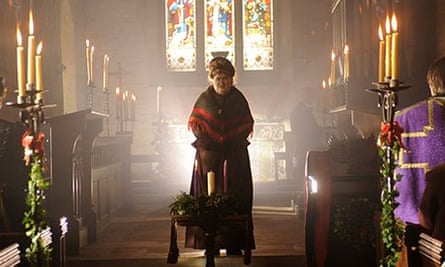
THERE IS AN unfortunate tendency to reduce Boyle to caricature: Susie Simple, as she was called at school. In fact she is quite complex. She is open about suffering from depression when she was younger, though she says her life is in a more positive phase now. Mood swings are part of her. "I can control it," she insists – though you can't help imagining her alone in this house. She thinks mental illness carries less stigma now. Yes, past generations sometimes thought of depression as self-indulgence, didn't they? "It's not indulgence," she insists with sudden, quiet authority. "It's a negative process, but if you can turn it into a positive it makes you stronger. Believe me."
Boyle loves her physical makeover: the glossy, chestnut hair that replaced the grey, and the posh frocks. But she doesn't want to change inside. She has not cut her working-class roots. "I'm not a money worshipper. I've always voted Labour. I'll never be a Tory." What about the Scottish independence referendum? "We need each other and depend on each other." Has travelling the world given her a broader perspective? "People who do that see how the jigsaw is put together," she agrees. "If you were independent, you would be cutting away a bit of the jigsaw and there would be a big hole in it."
Her most defining values come from God rather than politics – and we're not talking Simon Cowell. (She says Cowell has been important because he believes in her.) "I am a Roman Catholic and it's the backbone of my life. It's good to have that confidante. Believing in God makes you strong emotionally. You can take anything. Sometimes if you are feeling low, God gives you the ability to pull yourself together and get on with it." It's perhaps significant that she has a special affinity with Bernadette of Lourdes, a simple young French girl to whom the Virgin Mary is said to have appeared. "Bernadette was always the underdog, the person who got laughed at because people didn't believe her. I got laughed at because people didn't think I'd do well."
There's less laughter now. Susan Boyle is a multi-millionaire, one of the most commercially successful female singers of her generation. She might have been isolated her in childhood, but success has given her a sense of belonging and purpose. "I am here for a reason, and it must be to make people happy. I hope I can do that through my music." Asperger's may have caused communication difficulties, but there is no barrier, no boundary, when Susan Boyle sings. It is, in effect, her way of talking.
The album Home for Christmas is out now. Susan Boyle and Elvis Presley's duet, "Oh Come All Ye Faithful", is released today – all proceeds go to Save the Children. The documentary There's Something About Susan is on ITV1 on 12 December at 9pm
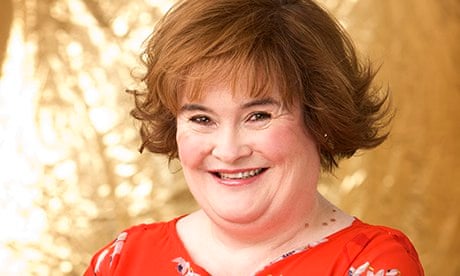
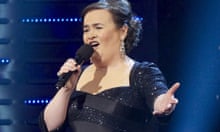
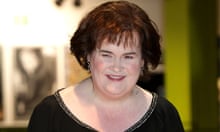
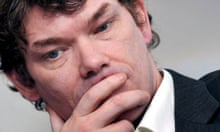

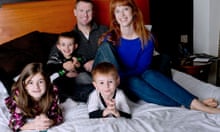
Comments (…)
Sign in or create your Guardian account to join the discussion